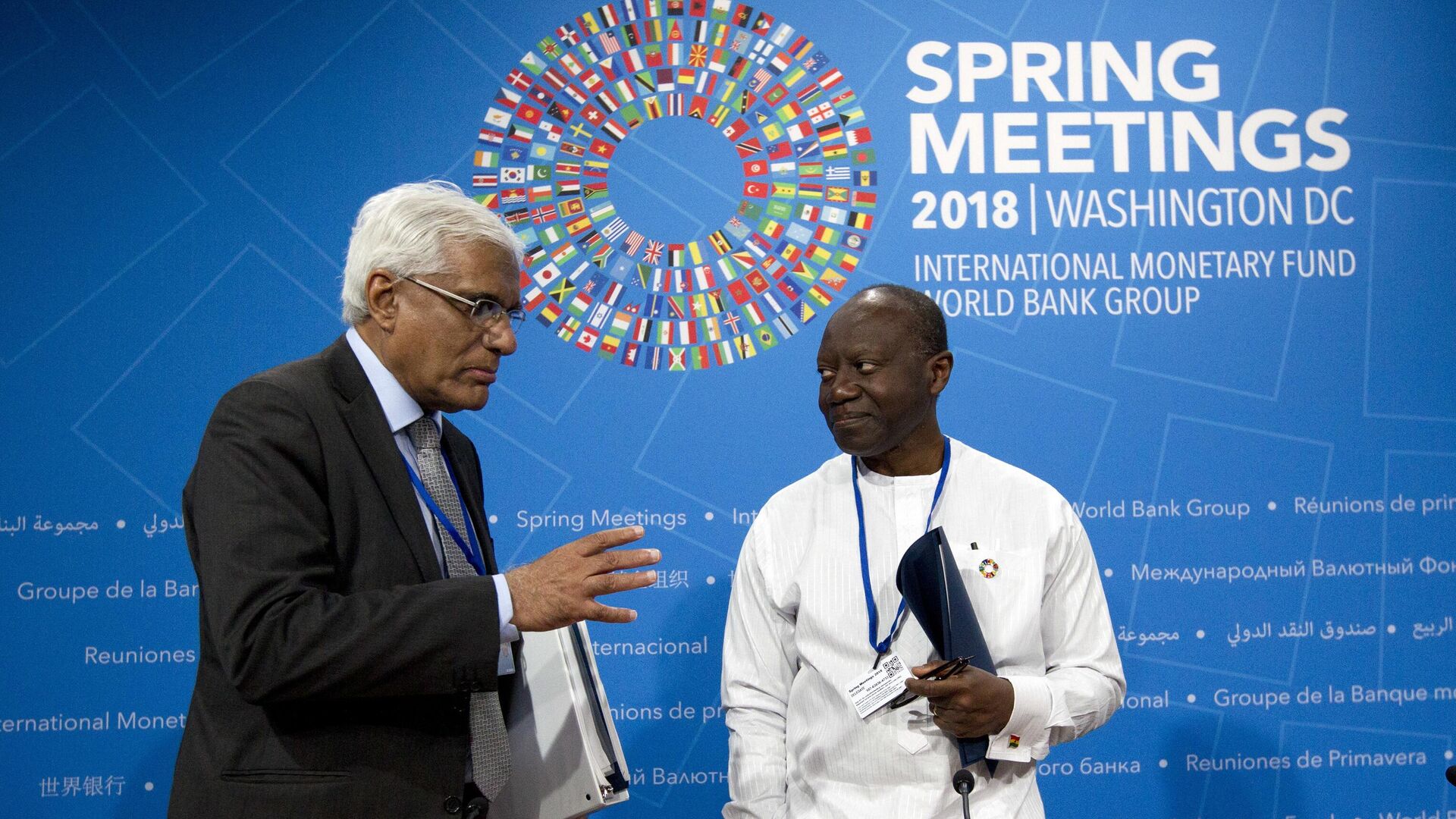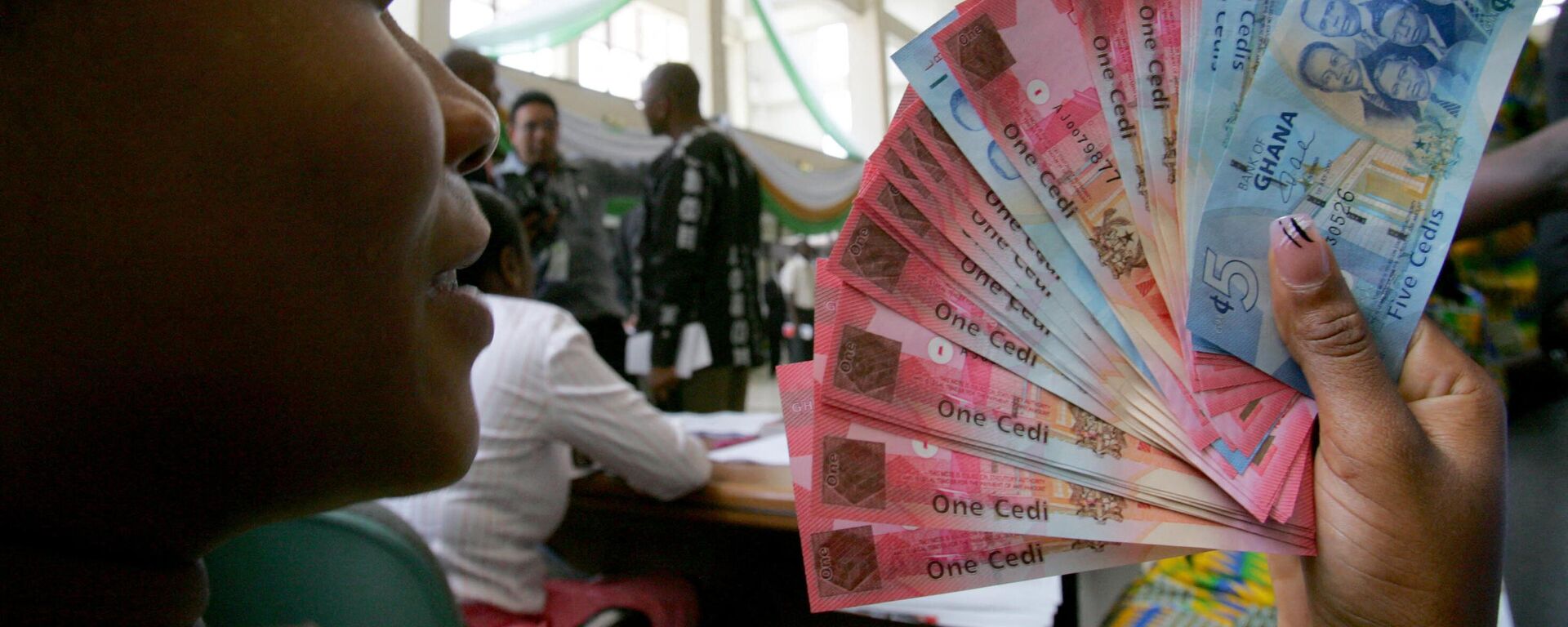https://en.sputniknews.africa/20230519/ghana--imf-global-markets-crucial-for-african-economies-but-west-is-hypocritical-expert-says-1059347838.html
Ghana & IMF: West's Policies Hypocritical, Global Markets Crucial for African Economies, Expert Says
Ghana & IMF: West's Policies Hypocritical, Global Markets Crucial for African Economies, Expert Says
Sputnik Africa
Fair trade and access to international markets are key ways in which developing countries can be supported by the international community, Anne Abaho, a lecturer at Nkumba University in Uganda, told Sputnik on Friday.
2023-05-19T16:30+0200
2023-05-19T16:30+0200
2023-08-03T10:44+0200
sub-saharan africa
west africa
ghana
international monetary fund (imf)
loan
economic growth
interview
economy
https://cdn1.img.sputniknews.africa/img/07e7/05/13/1059354435_0:71:3056:1790_1920x0_80_0_0_91ec96f23643e48970135bfa5a746048.jpg
Fair trade and access to international markets are key ways in which developing countries can be supported by the international community, Anne Abaho, a lecturer in international relations and security studies at Nkumba University in Uganda, told Sputnik. She was commenting on the recent approval of a multi-billion-dollar loan to Ghana by the International Monetary Fund (IMF) on Wednesday.The IMF's $3 billion bailout over three years includes an immediate disbursement of SDR 451.4 million (about $600 million) to help the West African nation "restore" its struggling economy, which has been hit hard by the COVID-19 pandemic and other domestic and global factors. The West African nation is expected to receive the remainder of the package in several installments, including a second disbursement of $600 million in November and further equal installments of about $350 million every six months.However, experts are divided on whether the IMF credit line is a debt trap or a benefit. Linwood Tauheed, associate professor of economics at the University of Missouri-Kansas City, believes that the IMF wants to get poorer nations into a "debt trap" in order to ensure that "the Western countries have control over not only the finances of those countries, but also the resources that those countries need to sell to the West in order to get the dollars in order to pay off those loans."Dr. Abaho also shared her views on the matter.Abaho argued that the expectation would be that Ghana would still have to pay off these $3 billion in debt, "but now that the debt is canceled, or the IMF has said they will write it off or rethink payment strategies, where do these African countries then spend the money?"The scholar insisted that it doesn't matter whether they get a bailout or a cancelation; it doesn't matter which country the cancelation goes to, pointing out that some time ago there was debt cancelation for most of the heavily-indebted countries, but there was no change on the ground.Abaho added that she believes that if the financial institutions don't tell Ghana that they want to see the changes it brings in terms of development, then the bailout will not necessarily "give Ghana much."She called on the IMF and World Bank to ensure that the money is invested in sectors that can benefit the country and its citizens.Moreover, Dr. Abaho suggested that the international community can support developing countries by offering fair trade and access to international markets instead of insisting on foreign direct investment or liberalization of the market. She believes that the IMF, World Bank, and World Trade Organization should collaborate with African and other developing countries to help them penetrate new markets and negotiate with the Western and Asian countries on how to make it possible.However, in her conclusion, Abaho noted, "But that doesn't mean that they shouldn't cut it, they shouldn't bail out, they shouldn't cancel the debt. Yes, they should, but we should see where this money actually goes."
https://en.sputniknews.africa/20230518/ghana-secures-3-billion-imf-package-to-aid-economic-recovery-1059326933.html
west africa
ghana
Sputnik Africa
feedback@sputniknews.com
+74956456601
MIA „Rossiya Segodnya“
2023
Muhammad Nooh Osman
https://cdn1.img.sputniknews.africa/img/07e7/04/0a/1058467512_0:0:1280:1280_100x100_80_0_0_ec723833bcbfcaed2e21952965ad99e4.jpg
Muhammad Nooh Osman
https://cdn1.img.sputniknews.africa/img/07e7/04/0a/1058467512_0:0:1280:1280_100x100_80_0_0_ec723833bcbfcaed2e21952965ad99e4.jpg
News
en_EN
Sputnik Africa
feedback@sputniknews.com
+74956456601
MIA „Rossiya Segodnya“
Sputnik Africa
feedback@sputniknews.com
+74956456601
MIA „Rossiya Segodnya“
Muhammad Nooh Osman
https://cdn1.img.sputniknews.africa/img/07e7/04/0a/1058467512_0:0:1280:1280_100x100_80_0_0_ec723833bcbfcaed2e21952965ad99e4.jpg
ghana, imf loan, imf bailout, ghana & imf, ghana economy, west's policies, anne abaho, nkumba university in uganda, imf's $3 billion bailout to ghana, $600 million, imf loan to ghana,
ghana, imf loan, imf bailout, ghana & imf, ghana economy, west's policies, anne abaho, nkumba university in uganda, imf's $3 billion bailout to ghana, $600 million, imf loan to ghana,
Ghana & IMF: West's Policies Hypocritical, Global Markets Crucial for African Economies, Expert Says
16:30 19.05.2023 (Updated: 10:44 03.08.2023) Muhammad Nooh Osman
Writer/Editor
With inflation at its highest in decades, Ghana's fiscal position has recently come under severe strain. In response, the IMF approved a $3 billion rescue package on Wednesday, including an immediate disbursement of $600 million to support the country's economy over the next three years.
Fair trade and access to international markets are key ways in which developing countries can be supported by the international community, Anne Abaho, a lecturer in international relations and security studies at Nkumba University in Uganda, told Sputnik.
She was commenting on the recent approval of a multi-billion-dollar
loan to Ghana by the International Monetary Fund (IMF) on Wednesday.
The IMF's $3 billion bailout over three years includes an immediate disbursement of SDR 451.4 million (about $600 million) to help the West African nation "restore" its struggling economy, which has been hit hard by the COVID-19 pandemic and other domestic and global factors. The West African nation is expected to receive the remainder of the package in several installments, including a second disbursement of $600 million in November and further equal installments of about $350 million every six months.
However, experts are divided on whether the IMF credit line is a debt trap or a benefit. Linwood Tauheed, associate professor of economics at the University of Missouri-Kansas City, believes that the IMF wants to get poorer nations into a "debt trap" in order to ensure that "the Western countries have control over not only the finances of those countries, but also the resources that those countries need to sell to the West in order to get the dollars in order to pay off those loans."
Dr. Abaho also shared her views on the matter.
"Whether Ghana or Nigeria or the biggest part of sub-Saharan African countries getting a bailout in the form of debt cancellation or whatever other form they get, I think the solution really for indebted countries in Africa is not so much bailouts, but it is the interest of the financial institutions, particularly the IMF and the World Bank, when they bail out these African countries or the heavily-indebted countries, on where does the money actually go?" she suggested.
Abaho argued that the expectation would be that Ghana would still have to pay off these $3 billion in debt, "but now that the debt is canceled, or the IMF has said they
will write it off or rethink payment strategies, where do these African countries then spend the money?"
The scholar insisted that it doesn't matter whether they get a bailout or a cancelation; it doesn't matter which country the cancelation goes to, pointing out that some time ago there was debt cancelation for most of the heavily-indebted countries, but there was no change on the ground.
"I think the biggest challenge is that the money is not actually invested in human capital," Abaho said. "It doesn't go into sectors that help develop the individual sectors like the markets, access to the markets, like education, like health services, like access to clean water, where people can benefit from these social aspects for them to improve who they are in terms of knowledge access, decision-making, generally human security."
Abaho added that she believes that if the financial institutions don't tell Ghana that they want to see the changes it brings in terms of development, then the bailout will not necessarily "give Ghana much."
She called on the IMF and World Bank to ensure that the money is invested in sectors that can benefit the country and its citizens.
Moreover, Dr. Abaho suggested that the international community can support developing countries by offering fair trade and access to international markets instead of insisting on foreign direct investment or liberalization of the market.
She believes that the IMF, World Bank, and World Trade Organization should collaborate with African and other developing countries to help them penetrate new markets and negotiate with the Western and Asian countries on
how to make it possible.
"So I think it is a little bit hypocritical for the developed world to say we are forgiving you here, when in the actual sense they are going to turn around Ghana and say the country is going to go back and say, you know what, we actually need money for the health sector now. We need money to improve the mineral sector. So to cut the long story short, it doesn't guarantee any change on the ground for the country which has benefited from the decision," the Nkumba University lecturer said.
However, in her conclusion, Abaho noted, "But that doesn't mean that they shouldn't cut it, they shouldn't bail out, they shouldn't cancel the debt. Yes, they should, but we should see where this money actually goes."



